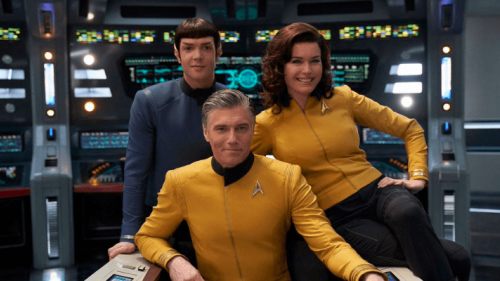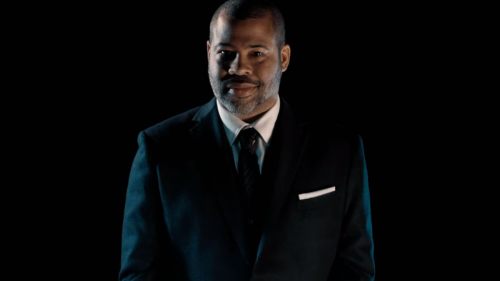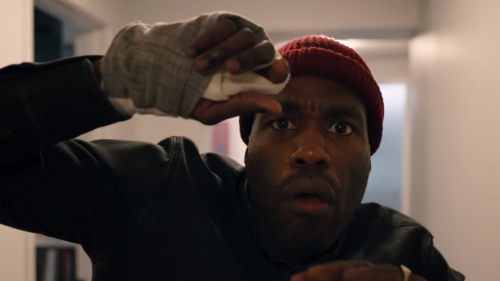THE TWILIGHT ZONE: Review “Replay”
If I’m being honest, I don’t have a strong attachment to any version of The Twilight Zone. Don’t get me wrong; I grew up watching plenty of its derivatives (there was a time when Jonathan Frakes’ Beyond Belief: Fact or Fiction was legit my favorite TV show), and I understand the show has had a monumental influence on TV writing and horror. Yet Rod Serling’s classic show—and the movie and revival series based off of it—remain abstract enough for me to hold them at a distance. Going into the 2019 revival, I had no expectations aside from “Will this be any good?”
And so far, yeah. I think it has been. Episode one, “The Comedian” had Kumail Nanjiani traverse the perils of fame in a way that was delightfully reminiscent of Death Note. Episode two, “Nightmare at 30,000 Feet”—while nowhere near as tense as the Shatner or Lithgow versions—admirably represented the white, masculine desire for control at the center of “civility” as an ideology. “Replay”, the latest episode, continues this streak of solid social commentary through a supernatural lens.
Sanaa Lathan stars as Nina, a mother who is driving her son, Dorian (Damson Idris), to his first week of college. Although the two clearly love one another, there’s some tension from the fact that Nina isn’t ready for her son’s upcoming independence. A self-made Black woman herself, Nina is especially dreading the challenges Dorian will face as a confidant Black man in a country rigged against him. Her worst nightmare comes true when an overzealous police officer (Glenn Fleshler) puts her son’s life in danger, but the tragedy is off-set when she discovers her camcorder has the supernatural ability to reverse time. Armed with a universal replay button, Nina embarks on a quest to avoid the inevitable, bending spacetime in a desperate bid to keep her son safe.
“Replay” makes it pretty clear from the jump that it wants to explore some touchy themes; police violence, respectability politics, and empty nest syndrome all play a part in Nina’s story. Yet none of these are the main focus, as they’re meant to serve a greater point about predestination, and the limited control Black people have over their destiny.
Like any good Twilight Zone episode, “Replay” is very focused and clear in its allegory, but if I have one complaint, it’s the same one I have for “Nightmare at 30,000”: the theming is a little too blunt, and will probably come off as stale for anyone who’s already familiar with the sociopolitical elements at play. It could also just be Gerard McMurray’s direction that’s leaving me wanting, because although McMurray excels at capturing this episode’s most intimate exchanges, he cuts back on the surrealism and subjectivity that made the first two episodes an adventure to watch.
It’s the actors here who add the texture to what’s an admittedly barebones parable. Lathan is working on multiple levels to portray Nina’s double-consciousness. The dual traits of being too world-weary to let her son out of her sight, yet optimistic enough to believe she can alter the course of time, come together very naturally in Lathan’s performance. Damson Idris excels in a role that’s surprisingly rare: a joyous, earnest, positively-expressive Black teen who stays true to who he is even when under pressure.
Glenn Fleshler (who you’ll remember but won’t recognize as the Lawnmower man from True Detective S1) is perfectly cast as Officer Lasky, the persistent, killer manifestation of passive white supremacy. Fleshler takes such a simple role and imbues it with enough intensity and subtlety that, in certain moments, I was kicking myself for wanting to learn more about his character’s motivation. (Thankfully, writer Selwyn Seyfu Hinds doesn’t indulge that instinct.)
Though I will say the threat of police violence in this episode doesn’t totally succeed in walking the tightrope that all media featuring police violence against Black lives must walk. The experience of getting threatened by the police as a Black person is such a unique combination of primal emotions and systemic awareness that I think we’re still trying to figure out how to present it in film language. Very few works have managed to portray it without feeling exploitative and/or undercooked, and by my metric, most of the run-ins in “Replay” fall under the latter category. It’s a bit of a shame, because producer Jordan Peele nailed those types of scenes in Get Out.
I feel it needs reiterating that I really liked this episode, and it’s definitely a solid entry in the new series. “The Comedian” is still the best episode, in my opinion, but “Replay” doesn’t lag too far behind it. It’s not exactly revelatory, but it’s definitely worth watching, especially if you’re already subscribed to CBS All-Access.



